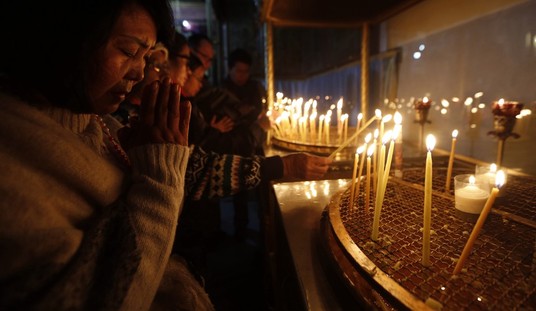Mark Steyn posts an update to the story of Muzzamil Hassan, the Buffalo-area cable entrepreneur who is accused of (and according to initial reports confessed to) beheaded his wife, and the expected cone of silence placed over the story by the legacy media:
Spousal murder is not unusual. Beheading your wife is. If Muzzamil Hassan decapitated his as an Islamic ritual, then his entire professional life — Mister Moderate Muslim — was a lie. In other words, it would be the work of moments for even the laziest hack to work up exactly the same “hypocrisy” angle that the press stampede after when some evangelical preacher turns out to have a thing for fetching young rent boys.
As I noted at the weekend, when Mr. Hassan launched his Bridges TV station to counter “negative stereotypes” of Muslims, he got the traditional tongue baths from NBC’s Brian Williams, NPR’s “All Things Considered” et al – even though the station was entirely unwatched. Don’t they have a responsibility to revisit the story now that it’s got a little more complicated – or, as old-school editors would say, “newsworthy” – than the press releases they read out a couple of years back?
From The Chicago Tribune, November 30th 2004:
Although many may welcome the channel as a vital voice missing from the mainstream media, scholars say it must transcend a number of obstacles to survive.
John Voll, director of the Center for Muslim-Christian Understanding at Georgetown University, said some audiences might have a hard time accepting Islam and modernity in the same package, which is exactly what the network hopes to demonstrate.
Not as hard a time as Mr. Hassan had reconciling Islam and modernity.
From NBC Nightly News, December 9th 2004:
[REPORTER RON] ALLEN: It’s the brainchild of Aasiya Zubair, an architect, and her husband, Muzzammil Hassan, a banker, who are disturbed that negative images of Muslims seem to dominate TV, especially since 9/11.
Ms. AASIYA ZUBAIR: I did not want my kids growing up to watch Muslims being portrayed as terrorists.No, indeed. Instead, it’s their father who turned out to be the terrorist — no different from the London School of Economics-educated British subject behind the beheading of Daniel Pearl.
That’s what makes this a story rather than one family’s tragedy. If you’re not intrigued by the apparent fraud at the heart of this man’s life and work — a fraud in which the U.S. media cheerfully colluded — you lack the elementary curiosity necessary to be a journalist.
We take for granted how easy it is to pop open a search engine such as Google and have immediate access to seemingly huge swatches of information. Prior to the ubiquity of the Web, and long before the rise of postmodernism as a cult philosophy, newspapers and (especially) television news relied upon a much more flexible relationship with the past. Stories could be buried; political viewpoints shuffled, Oceania, Eastasia, etc. For those journalists who still work primarily in those legacy mediums, (or who simply think of themselves as working in those older mediums) it’s very comforting to assume that 1975-era rules still apply, and just bury your head in the sand when a uncomfortable story such as Hassan’s comes along. Sure, the interview you did with him from 2004 might on YouTube somewhere, but likely the bulk of your remaining viewers at home don’t remember it–so why should you?










Join the conversation as a VIP Member